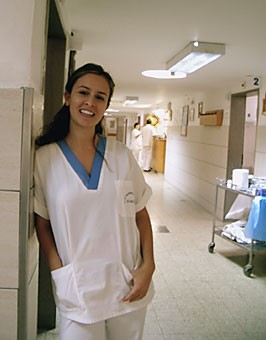As my last column goes to press, I’m on my way home. Although my time in Nazareth has passed quickly, I can’t help but think of the good things waiting at home for me: my family in Flagstaff, with whom I’ll spend Christmas; my four wonderful roommates who sent me e-mails and a care package; a quiet bed; Safeways and Targets; my less-than-luxurious, but still running, car; my cellphone; English speakers.
But as I long for home, I’ve thought about what “”home”” means. Last week, I traveled around Israel, from its heart in Jerusalem to its southernmost point at the tip of the Red Sea. And when the week was over, I took three buses, a train and a taxi to arrive home in Nazareth, bedraggled and exhausted, yet grateful for my own bed and familiar surroundings. I know very little Hebrew, so in most Israeli cities I feel lost and out-of-place. But returning to Nazareth, I can again understand some of the language, and I feel a sense not only of competence but of belonging.
A few days ago, I was in a restaurant in Egypt’s Sinai Peninsula when two little girls approached me selling jewelry. They had the vibrancy, wittiness and curiosity of children who have seen so little of the world that every moment reveals something new about it. They had never met a “”foreign-looking”” woman who spoke Arabic, but they were business-savvy, and they convinced me that I needed their wares.
After buying a woven bracelet and a beaded necklace from them, I bought a Coca Cola for them. Their eyes widened in anticipation as the older girl poured exactly half of the Coke into a glass. The younger girl, clearly unfamiliar with soda, drank it in quick, large gulps, her surprised eyes tearing up as the carbonation tingled in her mouth. I wasn’t sure whether she would laugh or cry, but when she finished, the surprise in her face was replaced by happiness and wonder at the existence of such a good thing.
I came to Nazareth to reclaim some of that curiosity and wonder. In many ways, I came as a child, unable to speak the language in complete sentences, dependent on others for food and shelter. And while I did not witness history-making wars or ceasefires or riots or rockets, I did see ordinary Nazarene life through eyes that had never seen it.
Nazareth has become a kind of home to me. I don’t just have a key to an apartment here; I have a daily and weekly routine of work and church and play; I have favorite shops and food stalls; and I have a family who looks out for me. The hospital’s doctors, administrators, nurses and janitors know me, as do the fruit vendors, the bus station managers and the phone operators. I’m still “”the foreign girl”” here, but I no longer wear that identity awkwardly; it is part of me. In fact, I think I am better known here than on my American college campus.
So I leave Nazareth with the anticipation of “”home”” but also wondering if “”home”” will be different now that I have adopted another for a season. And I know that I will return to Nazareth, maybe as a medical student, maybe as a doctor, maybe as an old friend on a visit.
The word “”Nazareth”” is derived from the old Hebrew word “”natzrat,”” which means “”branch”” or “”root.”” This dual meaning is fitting, since I hope that, while Nazareth has nourished me, I can take some of this city with me to inspire growth in others.
Marian Lacy is a senior majoring in Near Eastern studies, molecular and cellular biology and English. She has written her columns this semester from Nazareth, Israel, where she has been working in a hospital. She can be reached at letters@wildcat.arizona.edu









